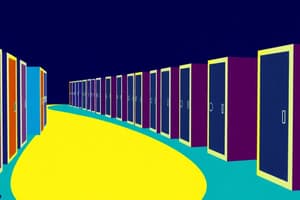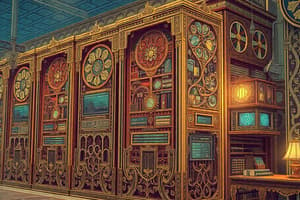Podcast
Questions and Answers
What is the classification of computer based on?
What is the classification of computer based on?
System performance, which affects physical size and cost
Which of the following are categories of computers from big to small?
Which of the following are categories of computers from big to small?
- Personal computer
- Mini computer (correct)
- Supercomputer (correct)
- Microcomputer (correct)
- Mainframe (correct)
What are supercomputers used for?
What are supercomputers used for?
Number crunching, scientific simulations, and scientific research
What are 'Monsters' in computing?
What are 'Monsters' in computing?
What is a mainframe?
What is a mainframe?
Why have minicomputers become rarely used today?
Why have minicomputers become rarely used today?
What is a terminal?
What is a terminal?
What defines a microcomputer?
What defines a microcomputer?
What are the types of PCs classified based on size?
What are the types of PCs classified based on size?
What is a desktop computer?
What is a desktop computer?
What is a motherboard?
What is a motherboard?
What does disk storage refer to?
What does disk storage refer to?
What defines a laptop computer?
What defines a laptop computer?
What is a notebook computer?
What is a notebook computer?
Flashcards are hidden until you start studying
Study Notes
Classification of Computers
- Classification is based on system performance, which influences physical size and cost.
Categories of Computers
- Classification ranges from supercomputers (largest and most powerful) to microcomputers (personal computers).
- Categories include: Supercomputers, Mainframes, Minicomputers, Microcomputers (PCs).
Supercomputers
- Examples include Cray T3E-900 and GRAPE-4, recognized as the largest and fastest computers.
- Primarily used for scientific simulations, research in energy, space exploration, medicine, and industry.
- Considered the most expensive computers, often costing millions of dollars.
- Frequently found in organizations like NASA.
Monsters
- "Monsters" refers to custom-built supercomputers that require specialized technical teams for maintenance.
Mainframe Computers
- Very large, powerful, and expensive, serving as tailored systems for larger organizations.
- Offers faster processing speeds and greater storage than minicomputers, supporting over a hundred users simultaneously.
- Commonly utilized in banks, insurance companies, and corporations.
Minicomputers
- Became outdated, popular in the 1960s with capabilities between PCs and mainframes.
- Used primarily in small manufacturing plants and research labs.
- Allowed multiple users to share processing needs through terminals, with systems mass-produced in factories.
Terminals
- Terminals in minicomputers enable shared access to hardware by users.
- Typically consist of a keyboard, display screen, and connection wire to the computer system.
Microcomputers (Personal Computers)
- Also known as PCs, designed for individual use, available in various designs and forms.
- Include components such as a system unit, keyboard, mouse, and display screen, executing multiple tasks.
- Mass-produced with options for customization in software and hardware.
Types of PCs
- PCs classified based on size and cost include:
- Desktop
- Notebook
- Laptop
- Netbook
- Tablet
- Palmtop
Desktop Computers
- Designed for regular use at a designated location, typically near a desk.
- Common configuration includes power supply case housing motherboard, CPU, storage, keyboard, mouse, monitor, and speakers.
Motherboard
- A printed circuit board containing the CPU, memory, bus, and other essential electronic components.
Disk Storage
- Typically comprises hard disk drives, optical disc drives, and older models may include floppy disk drives.
Laptop Computers
- Portable computers with a flat display screen, weighing between 1 to 4 kilograms.
- Include notable types such as notebooks and sub-notebooks.
Notebook Computers
- A portable type of laptop weighing 2 to 4 kilograms with a size comparable to a thick notebook.
- Features a large color screen and keyboard, with touch-sensitive pads serving as mice.
- Easily transportable, utilizing electric outlets or rechargeable batteries, and can offer similar power to desktops but typically at higher costs.
Studying That Suits You
Use AI to generate personalized quizzes and flashcards to suit your learning preferences.




